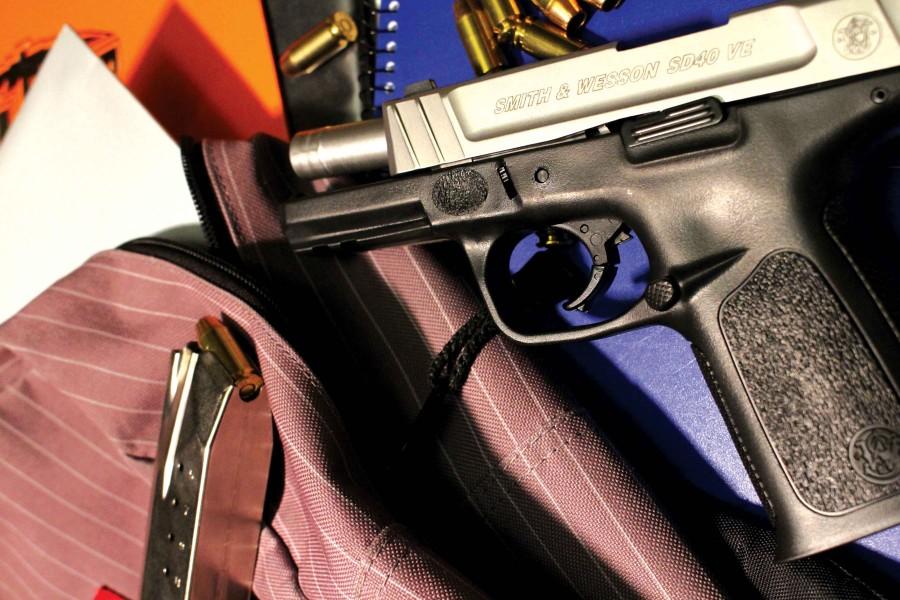As Senate Bills 11 and 17 move forward, Texans find themselves closer to the possibility of not only being able to openly carry guns, but also being able to sport concealed firearms at public colleges and universities.
On Thursday, Feb. 12, the Texas Senate Affairs Committee approved both bills by votes of 7-2, which will now send the bills to the full Senate. Voting against the bills were the committee’s two Democrats.
Of the two bills, Senate Bill 11 would lift the ban on concealed handguns on university campuses, and Senate Bill 17 would allow gun owners with a license to carry holstered guns in public places.
However, lawmakers amended one of the bills in the event that if both were to pass, open carry wouldn’t be allowed on state university and college campuses.
The bills passed, despite facing opposition from law enforcement, some universities and gun control advocates.
State Sen. Jose Rodriguez, who leads the opposition to gun proliferation, issued a press release where he stated that the issue is not about taking people’s guns away, but rather about protecting them.
“I am deeply concerned that the bills proposed today would greatly expand the reach of handguns in the public sphere without doing enough to protect the public by keeping guns out the hands of criminals and other violent elements,” Rodriguez said.
Regarding concealed carry of firearms on campuses, Rodriguez said they are places for learning, and those responsible for the education and safety of students are saying that the proposals simply don’t make sense.
“As much as I like guns, I feel like it would increase the risk of a shooting. Yes, it might be evened out if I have a gun, but it would be better if people were just not armed at all,” said Carla Stevenson, junior business major.
Those in favor of the bills,
however, said that the possibility of someone carrying a gun might deter possible criminals.
“I think it’s great, it will allow people to protect themselves and there will be less crime. Usually, there is less crime where people are able to defend themselves,” said Michael McIntyre, general manager from local gun store and shooting range, Gun Central.
There is also debate on how the laws might affect both perception and response from law enforcement and citizens.
Dr. Charles Boehmer, associate professor of political science, said that the perception of threat is a technical issue some have brought up since it’s not easy to determine if someone is up to no good.
“There is some technical issues and complications that just involve guns in general, especially in crisis situations,” Boehmer said. “Those go beyond the kinds of scenarios that are often depicted.”
A similar scenario was brought up by several police chiefs who testified against the measures. They pointed out that law enforcement agencies would be strained and it would make it difficult to identify possible criminals at the scene of a crime.
Among those who testified was Austin Police Chief Art Acevedo, who presented data which showed that 76 percent of 300 Texas police chiefs polled were against open carry laws.
However, not all law enforcers agreed that the bills were unnecessary or a burden.
McLennan County Sheriff Parnell McNamara testified that he is in complete support of concealed carry on campus, as police can’t be everywhere at once and it gives Texas students a chance to protect themselves.
“People have a right to survive. They have an obligation to get home to their loved ones,” McNamara said.
At the hearings, two of the state’s top universities made their opinions known regarding whether campus carry would comprise student safety.
University of Texas System Chancellor William McRaven sent a letter to the hearings to be read. He said his concern was that passing the bills would make universities less safe, because of the stress and emotional strain students might be subject to.
In contrast, Texas A&M University System Chancellor John Sharp, who also sent a letter to the hearings, said that campus carry did not raise safety concerns for him and that the real question for him was trust.
“The real question is this, do I trust my students, faculty and staff to work and live responsibly under the same laws at the university as they do at home?” Sharp wrote. “Of course I do.”
Alonso Moreno may be reached at [email protected].











VIANAH A. SOLIS • Sep 2, 2015 at 10:53 AM
When will the meeting take place where students, faculty, and staff may show their opinion?